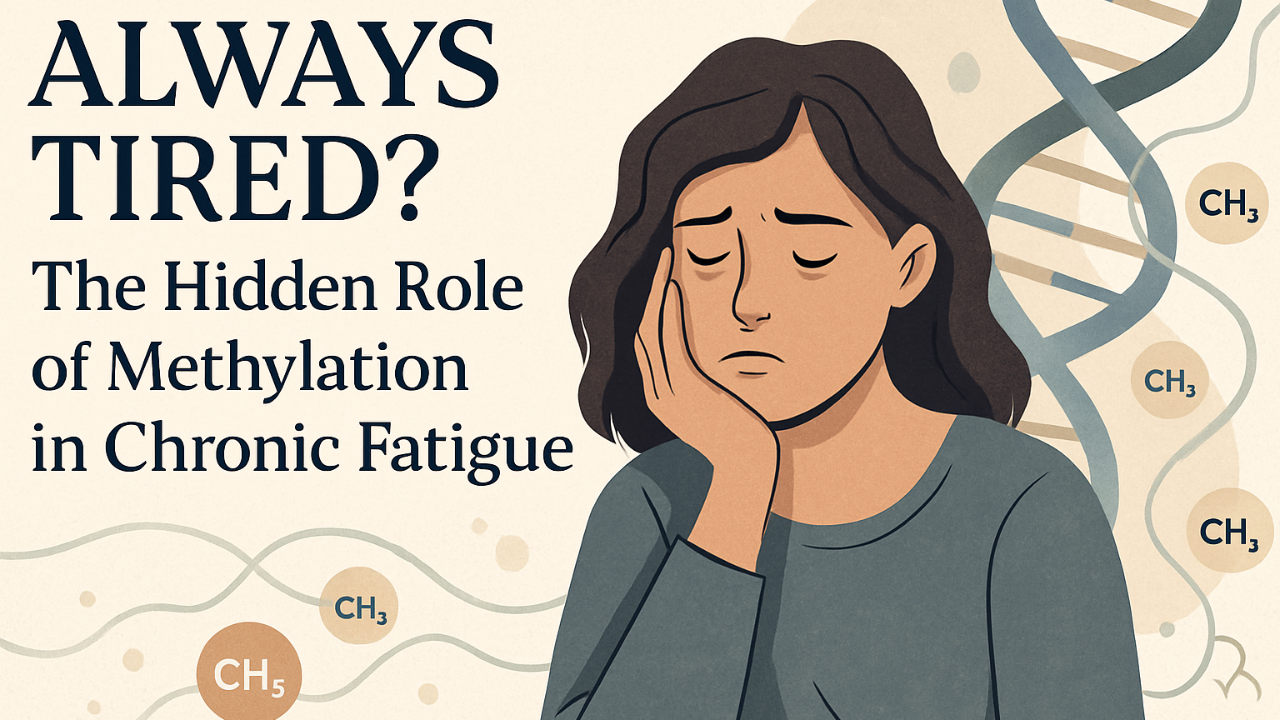Always Tired? The Hidden Role of Methylation in Chronic Fatigue
Apr 20, 2025
Understanding Chronic Fatigue in a “Healthy” Lifestyle
The Paradox of Fatigue Despite Clean Living
You meditate. You eat clean. You’ve cut sugar, balanced your macros, and even tried energy supplements. Yet, you’re still dragging through your day. The reality is, even a healthy lifestyle can’t always override deeper, internal imbalances.
When Rest Isn’t Enough
If sleep no longer feels restorative, and fatigue lingers no matter how much you “do right,” it’s time to look beneath the surface. Chronic tiredness could be a signal of deeper biochemical stress, particularly in your body’s methylation system—a hidden, but critical part of how we generate and regulate energy.
The Role of Methylation in Energy Production
What Is Methylation?
Methylation is one of your body’s master switches. It’s a chemical process that adds “methyl groups” to molecules to turn biological functions on or off. This tiny but mighty process plays a key role in energy production, detoxification, mood balance, immune function, and even DNA repair.
Core Biological Functions Methylation Supports
Energy Production
Methylation is essential for creating ATP—the energy currency of your cells. When this process stalls, so does your stamina.
Detox Pathways
Your liver relies on methylation to process toxins efficiently. A backlog here means more internal burden and fatigue.
DNA Repair
Cell repair and regeneration also depend on proper methylation. Without it, your body remains in a low-functioning, overworked state.
Methylation and Fatigue: Connecting the Dots
How Sluggish Methylation Impacts Your Energy
If methylation is slowed due to nutrient deficiencies, genetic variations, or environmental stressors, your body may experience an energy bottleneck. This causes everything from brain fog to deep, unshakeable exhaustion.
Common Symptoms of Methylation-Related Fatigue
- Unrefreshing sleep
- Midday crashes
- Sensitivity to supplements
- Feeling tired and wired
- Overstimulation from lights, noise, or smell
These signs often go unnoticed or are dismissed as stress, but they can indicate deeper metabolic strain.
Signs Your Fatigue Could Be Linked to Methylation
Sensitivity to Supplements
Ever felt worse after taking a multivitamin or energy drink? For some, methylated B vitamins like methylfolate and methylcobalamin can trigger overstimulation if methylation pathways are blocked.
Unrefreshing Sleep and Midday Crashes
Methylation regulates your sleep-wake cycle. When it’s out of sync, sleep doesn’t restore, and your energy dips hard in the afternoon.
Sensory Overload and Emotional Strain
A taxed methylation system can lead to nervous system hypersensitivity, leaving you reactive to stimuli others tolerate easily.
When Lab Work Looks “Normal”… But You’re Not
Why Conventional Testing Misses Methylation Issues
Typical labs may look fine, but they often exclude key metabolic markers, like homocysteine, glutathione, and methylation cofactors. Without these, subtle dysfunctions go undetected.
The Role of MTHFR and COMT Genetic Variants
Genetic polymorphisms in MTHFR or COMT can alter how your body processes nutrients and stress. These genes impact methylation speed and efficiency, changing how you respond to even basic supplements.
The Hidden Impact of Supplement Overload
Why More Stimulation Backfires
Adding stimulants like caffeine, high-dose B vitamins, or nootropics might temporarily help—but often lead to crashes. This is because a weak foundation can’t handle the load you’re placing on it.
The Risk of Supplement Stacking
Trying multiple products without understanding your body’s capacity can overstimulate, rather than energize. For those with methylation issues, less is often more.
The Right Way to Support Methylation
Start by Simplifying
Strip your supplement routine down to essentials. Remove anything that seems to trigger crashes or overstimulation.
Gentle Detox and Nervous System Support
Before adding in energy-producing compounds, support your detox and nervous system first. Breathwork, Epsom salt baths, and magnesium can help reduce internal congestion.
When and How to Introduce B Vitamins
Start with low doses of non-methylated forms like hydroxo B12 or folinic acid, especially if you’re sensitive.
Foods That Support Natural Methylation
Nutrient-Rich Whole Food Sources
- Leafy greens: high in folate
- Eggs and liver: rich in choline and B12
- Beets and lentils: great for natural methylation flow
Foods to Avoid or Minimize
- Synthetic folic acid (common in processed foods and most big box brand multivitamins)
- Alcohol, which can impair methylation and glutathione production
Lifestyle Tweaks That Can Make a Big Difference
Magnesium, Breathwork, and Nervous System Resets
Daily calming practices restore balance and open up methylation capacity. Think: magnesium-rich foods, grounding exercises, and slow movement.
Monitoring and Journaling for Biofeedback
Track energy patterns after meals or new supplements. Your body’s real-time responses are more accurate than lab results.
Personalized Methylation: Why Your Genes Matter
The Role of Nutrigenomics
Nutrigenomics helps uncover your unique biochemical blueprint. Once you know your gene variants, you can build a more precise wellness plan.
Why One-Size-Fits-All Solutions Fail
What works for one person’s fatigue might overload another. Genetics, environment, and lifestyle all shape your methylation response.
Real-Life Case Patterns We Often See
The Tired-and-Wired Professional
Highly driven but constantly exhausted. Reacts poorly to stress and energy boosters.
The Sensitive Supplement Responder
Clean eater, takes care of themselves, but crashes after standard vitamins or detox plans.
Myths About Energy and Fatigue Debunked
“Just Take More B12”
Not everyone benefits from more B12. For some, it causes anxiety or crashes, especially in methylated forms.
“It’s All in Your Head”
Chronic fatigue is biochemical, not just emotional. Your feelings are valid, and science supports your experience.
What Not to Do When Addressing Chronic Fatigue
Over-Supplementing
More isn’t better. Piling on supplements can worsen methylation blockages.
Ignoring Nervous System Regulation
Without calming the nervous system, even the best nutrients can’t land where they need to.
Step-by-Step: A Gentle Path to More Energy
Remove Excess
Clear the clutter—mental, environmental, and supplemental.
Support Foundational Pathways
Start with detox, liver support, and nervous system balance.
Introduce Stimulants Last (If Needed)
Only after the groundwork is laid, consider mild stimulants—if your body responds well.
When to Seek Personalized Guidance
If you’ve hit a wall or reacted poorly to typical energy solutions, it may be time to work with a practitioner trained in methylation and nutrigenomics.
What Can You Do About Your Fatigue? Ever Consider Genetic Testing to Find Out?
If you’re reading this and thinking, “I haven’t done any of this yet, but I’m curious,” you are not behind.
If you’re looking for a genetic panel that covers all five systems above, methylation, histamine, detox, neurotransmitters, and hormone clearance — this is the panel I trust and use in practice.
It is called The Works Panel by MaxGen Labs and it’s the same test I’ve used with hundreds of patients over the years to guide real, personalized care.
You can start there. And come back here when you are ready to make sense of what you find.
FAQs About Methylation and Chronic Fatigue
-
What tests reveal methylation problems?
Tests like homocysteine, organic acids, and DNA methylation panels can offer insights.
-
Is methylation support safe long-term?
Yes, when customized to your body’s needs and monitored properly.
-
Can fatigue resolve fully?
Many people experience dramatic improvement with proper sequencing and support.
-
Do I need genetic testing?
It helps, but symptom patterns alone can often guide support effectively.
-
What about children and teens?
Yes—methylation issues can show up early as fatigue, anxiety, or focus problems.
-
How quickly will I feel better?
Some people feel better in days, others take weeks or months. The key is steady, personalized progress.


